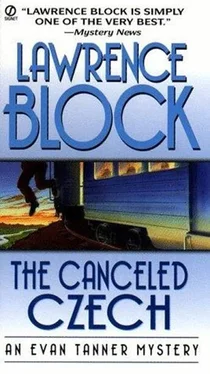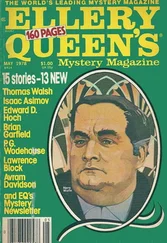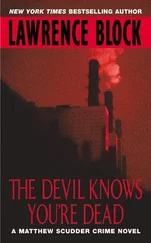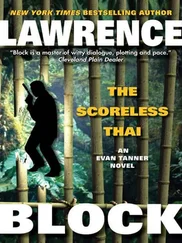“I do not like your friend,” Ferenc said.
“You cannot dislike him as much as I do.”
“Oh?”
“I have been with him longer. I make excuses for him – his age, the state of his health. But I have grown to hate him.”
“And yet you save his life.”
“There are reasons I cannot tell you.”
“You do not share his beliefs?”
“God, no!”
“But you have your reasons.”
I picked my words with care. “He can supply valuable information. He knows secrets that others would like to know. I have managed to convince him that I am the sort of man he is. That I share his beliefs. It shames me to be with him, it sickens me to have him for company, but I do what I must.”
Ferenc spent several minutes digesting this. Throughout it all, Kotacek was talking in the back seat. We both ignored him. Finally Ferenc said, “I am armed, you know. I have a pistol.”
“I did not know that.”
“I took it for protection en route, and to give to you at the border. You yourself should not be unarmed. Then I had thought of using it to kill the Slovak, once I realized who he was. My parents were partisans during the war, you see. He takes me for a Hungarian fascist, this Slovak of yours, but you see he is quite wrong. I thought I might have to kill you as well, but if you are like him, I think I could do so without any bad feelings. Now I do not know whether to believe you.”
“You know of me?”
“I do now. Not when you called, but while Lajos went for you I did some investigating. You seem to be one of us.” He paused. “I am not going to kill you or your friend, of course.”
“Do not call him my friend.”
“Forgive me. I of course am not going to kill anyone; I do not preface acts of violence with small speeches. Instead I am going to forget the name of my back-seat passenger. I never knew his identity. He never once awoke, and I had no idea who he was. You understand?” I nodded. “And in return,” Ferenc Mihalyi continued, “you must do me one favor.”
“What is that?”
“You must never tell anyone that it was I who helped this bit of filth to escape. I will tell no one that he is alive, and you will tell no one that I am partially responsible for his existence.”
“Agreed.”
“A hellish bargain. He should not be allowed to live.”
“He is old, and sick. He won’t live too long.”
“He has already lived too long.”
The rest of the trip was dreary. Conversation stopped entirely. Ferenc and I could no longer talk to one another. We had each of us shed portions of self-respect, and we wanted only to separate and forget the entire night. We had genuinely liked each other at the beginning. Then Kotacek had awakened and spoiled everything, and now we could not wait to be away from each other.
We reached the border. The trip took less than two hours, because from the moment of Kotacek’s awakening Ferenc had stepped up the pace, careening around curves at seventy miles an hour, driving as fast as he dared and somewhat faster than I dared in reckless haste to divest himself of his passengers. I did not blame him.
We waited in the car, Kotacek and I, while Ferenc found the proper guard and made the proper arrangements. Then he came back for us and led us to the break in the fence. The guard had carefully deserted his post, as had his Yugoslav opposite number. They would return, Ferenc told us, in ten minutes. By that time we were to be across the border and well on our way.
Kotacek walked through first. Ferenc produced a small black automatic from his jacket pocket. For a moment I thought he might shoot Kotacek in the back. At the time I would not have stopped him. Then he sighed and presented me with the gun.
“You may need this.”
“I hope not.”
“Perhaps one day you will come back to Hungary, without such baggage as this.”
“I hope to.”
“You will be welcome with us.”
“You are kind, and generous.”
“The gun,” he said. “Should the situation change, should you have occasion to kill the Slovak, I would be pleased if you saw fit to use the gun.”
He turned without a handshake and walked back to his friend’s car. I hesitated only for a moment, then crossed through the break in the Hungarian fence, walked twenty yards to my right, found the break in the Yugoslav fence and crossed into Yugoslavia. I looked at the gun, at Kotacek, and over my shoulder. Ferenc was driving back toward Budapest. I put the gun in my pocket.
With Kotacek I had played the earnest Nazi, with Ferenc the liberal anti-fascist revolutionary. I examined my own feelings, the hatred I felt for my sloppy, sickly loud-mouthed cargo, and then I thought of my speech in Pisek, my address to the Bund. How the words had leaped from my throat with a will of their own. How role-playing had carried me along.
I thought of the Red Queen’s advice to Alice. Speak French when you can’t think of the English for a thing, walk with your toes turned out, and remember who you are.
Remember who you are. It was not all that easy, and getting harder all the time.
There was atime when they described the Balkans as the patchwork quilt of Europe. Since then the Iron Curtain had descended and the Soviet army had dyed the old quilt a uniform shade of red. Yet Yugoslavia remained the old Balkan patchwork quilt in microcosm.
In a way, the nation was like a carefully assembled jigsaw puzzle. From a distance one saw only the picture which had been created, one of progress and peace and harmony, independence from Russia, industrial progress, increasing westernization, a burgeoning tourist trade, and so on. But closer up the cracks appeared. Closer up one saw that the whole was composed of an infinity of little oddly shaped pieces held precariously together. Croatians, Serbs, Slovenes, Dalmatians, Montenegrins, Bosnians, Hercegovinians, Macedonians, all carefully if tenuously interlocked in a pattern called Yugoslavia.
A delightful country.
We crossed the border near Subotica, in the Serbian province of Voyvodina. We passed southward through the country step by careful step, making more stops than a milk train, moving from one band of fanatics to another. In Subotica we were received by two old women, spinsters, sisters, who claimed to be vaguely but directly related to the last king of Yugoslavia. They were monarchists and prayed for the restoration of a Serbian king to the Yugoslav throne. They fed us, we bathed, and they summoned a great-nephew of theirs with a horsecart. He had no idea of our politics and didn’t seem to have much understanding of his aunts’ political ideas either, but he took us twelve miles down the road before dropping us off and turning back to Subotica. We went from the monarchist ladies to a trio of Bosnian anarchists, from them to some Croat nationalists, and so it went, all the way through the country.
It took us a full week to go something like four hundred miles, although we probably covered twice that distance, zigging and zagging, going up some mountains and down others and around still others. It would have gone faster without Kotacek, but then without him there would have been no reason to take the trip in the first place. I didn’t mind spending the time, anyway. As I’ve said, I like Yugoslavia. I liked eating bits of roasted lamb around a campfire in the hills of Montenegro. I liked talking with bitter-eyed young men in dimly lighted apartments, on hillsides, in farm cottages. I liked everything but Kotacek, and I was getting to the point where I could put up with him. Not because he was becoming tolerable. Never that. On the contrary, he had become increasingly loathsome to the point where I hated him with a steady, unremitting hatred. His words could not bother me now, not once I got to the stage of complete hatred. His delaying tactics, his need for insulin, his constant grumbling, his just as constant urinating, his propensity for embarrassing me, all of this ceased to have any particular effect upon me. With or without them, I hated the man.
Читать дальше












